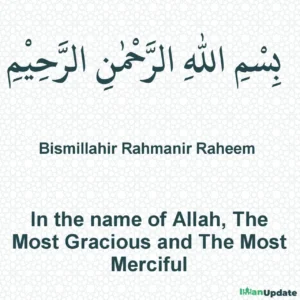Radi Allahu Anhu in Arabic with Meaning in English

“Radi Allahu Anhu” is an Arabic phrase that is commonly used by the majority of Ahlus Sunnah (adherents of the Sunni tradition) to express respect and veneration when mentioning the names of the companions of the Prophet Muhammad (peace be upon him).
Radiallahu Anhu in Arabic
Radiyallahu anhu in Arabic text can be written as
رَضِيَ اللهُ عَنْهُ
Radi Allahu Anhu Meaning in English
Radiyallahu anhu means may Allah be pleased with him. It used after a companion of prophet Muhammad SAW. The abbreviation is RA.
This term is often translated as “May Allah be pleased with him” and is a way of honoring and showing appreciation for the companions’ dedication, sacrifices, and contributions to the spread of Islam.
Radiallahu anhu For Female and Plural Variation
When mentioning the companions of Prophet Muhammad (peace be upon him), Muslims use the Arabic phrase “Radiallahu anhu” (رضي الله عنه) to show respect.
This phrase translates to “May Allah be pleased with him” in English. There are variations of this phrase depending on the gender and number of companions being referred to:
- For male companions: Radiallahu anhu (رضي الله عنه)
- For female companions: Radiallahu anha (رضي الله عنها)
- For a group of companions: Radiallahu anhum (رضي الله عنهم)
- For two companions (dual form): Radiallahu anhuma (رضي الله عنهما)
Using these phrases is a way for Muslims to express their reverence and admiration for the companions, who played a significant role in the history of Islam.
By saying “Radiallahu” followed by the appropriate suffix, Muslims are invoking Allah’s pleasure upon these esteemed individuals.
READ ALSO: Bismillahi Rahmani Raheem in Arabic With Meaning in English
Radi Allahu Anhu in Quran
Allah mentions that He is pleased foremost with the Muhajirin, Ansar and those who followed them in faith, and that they are well-pleased with Him, for He has prepared for them the gardens of delight and eternal joy.
This is mentioned is surah Taubah verse 100 where he said;
وَٱلسَّٰبِقُونَ ٱلۡأَوَّلُونَ مِنَ ٱلۡمُهَٰجِرِينَ وَٱلۡأَنصَارِ وَٱلَّذِينَ ٱتَّبَعُوهُم بِإِحۡسَٰنٍ رَّضِىَ ٱللَّهُ عَنۡهُمۡ وَرَضُواْ عَنۡهُ وَأَعَدَّ لَهُمۡ جَنَّٰتٍ تَجۡرِى تَحۡتَهَا ٱلۡأَنۡهَٰرُ خَٰلِدِينَ فِيهَآ أَبَدًاۚ ذَٰلِكَ ٱلۡفَوۡزُ ٱلۡعَظِيمُ.
And the first forerunners [in the faith] among the Muhajireen and the Ansar and those who followed them with good conduct – Allah is pleased with them and they are pleased with Him, and He has prepared for them gardens beneath which rivers flow, wherein they will abide forever. That is the great attainment.

Understanding the Difference between Alaihissalam and Radi Allahu Anhu
In Islamic etiquette, two Arabic phrases are commonly used to convey respect and blessings: “Alaihissalam” (عليه السلام) and “Radiallahu Anhu” (رضي الله عنه).
While both phrases are used to show reverence, they serve distinct purposes and are used in specific contexts.
Alaihissalam (عليه السلام):
- Used after mentioning the names of prophets in Islam, such as Adam, Nuh, Ibrahim, Musa, Isa, and Muhammad (peace be upon them all)
- Translates to “Upon him be peace” or “Peace be upon him” in English
- Invokes peace and blessings upon the prophets
- Can be used with anybody, but later became reserved for messengers, prophets, angels, and righteous people
Examples:
- Mariam Alaihassalam (Mary, the mother of Jesus)
- Jibril Alaihissalam (Angel Gabriel)
Radiallahu Anhu (رضي الله عنه):
- Used after mentioning the names of the companions of the Prophet Muhammad (peace be upon him)
- Translates to “May Allah be pleased with him” in English
- Invokes Allah’s pleasure upon the companions
- Specifically used for the companions of the Prophet Muhammad
In summary, “Alaihissalam” is used to invoke peace upon prophets, while “Radiallahu Anhu” is used to invoke Allah’s pleasure upon the companions of the Prophet Muhammad.
Each phrase serves a specific purpose in Islamic etiquette and expresses the reverence Muslims hold for both prophets and their companions.






